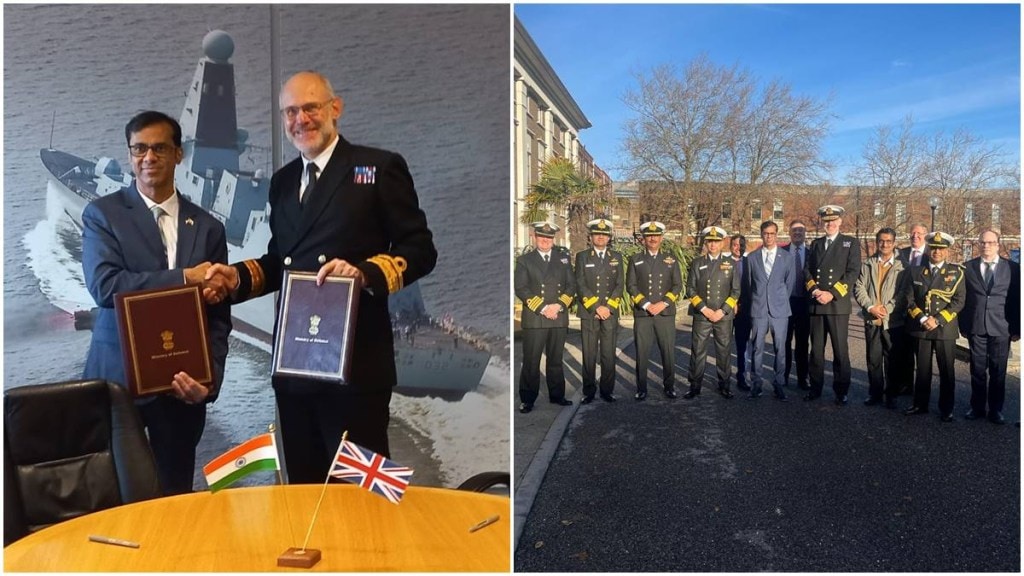On November 28, 2024, India and the United Kingdom formalized a significant step toward enhancing India’s naval capabilities by signing a Statement of Intent (SoI) focused on the development of Electric Propulsion Systems. The agreement was reached during the third meeting of the India-UK Electric Propulsion Capability Partnership, held in Portsmouth, UK, marking a key moment in the growing defence ties between the two nations. This partnership is set to drive technological innovation, with a specific focus on integrating advanced electric propulsion systems into India’s naval platforms.
What the Statement of Intent Means
The SoI serves as a framework for future cooperation in the development and production of Integrated Full Electric Propulsion (IFEPS) systems for Indian naval vessels. This includes joint efforts in co-design, co-creation, and co-production of the propulsion systems, which are expected to power India’s future fleet, including Landing Platform Docks (LPDs). These LPDs, which are planned to be built at Indian shipyards, will be among the first to feature a Full Electric Propulsion System, a key technology in the Navy’s modernization drive.
The agreement was signed by Rajeev Prakash, Joint Secretary of Naval Systems, India, and Rear Admiral Steve McCarthy, Director of Ships Operations & Capability Integration, UK Ministry of Defence. The signing underscores a strong commitment by both nations to collaborate on cutting-edge technology and enhance India’s self-reliance in defence, particularly in maritime propulsion systems.
Why This Partnership is Critical for India’s Defence Goals
The collaboration between India and the UK is particularly significant in the context of India’s Atmanirbhar Bharat (self-reliant India) initiative, which aims to build indigenous defence capabilities and reduce dependence on foreign technology. As part of the agreement, a Memorandum of Understanding (MoU) was also signed between Bharat Heavy Electricals Limited (BHEL), India’s public sector powerhouse, and GE Power Conversion, a UK-based leader in electric propulsion technology. This MoU will leverage the combined expertise of both organizations, ensuring that India can develop advanced electric propulsion systems domestically, with support from global technological leaders.
For India, the goal is to accelerate the induction of advanced propulsion systems into the Navy, thereby enhancing the operational efficiency, fuel economy, and stealth capabilities of its naval vessels. The collaboration will allow India to strengthen its naval assets with cutting-edge propulsion technologies while boosting its domestic manufacturing capabilities.
Electric Propulsion: A Game-Changer for Naval Operations
Electric propulsion systems offer several advantages over traditional mechanical systems, which make them highly desirable for modern naval platforms. The key benefits include greater flexibility in the design of power generation equipment, improved fuel efficiency, and the ability to enhance a ship’s stealth features by reducing noise and vibration. As naval operations become more complex and technologically sophisticated, these systems will play a critical role in improving the operational effectiveness of the Indian Navy’s fleet.
The Integrated Full Electric Propulsion System (IFEPS) enables better energy management and distribution, which is crucial for managing the increasing demands of modern ships. Additionally, it allows for a reduced environmental footprint through enhanced fuel efficiency, which is especially important for long-duration naval missions.
The UK has long been a leader in maritime propulsion technologies, with decades of experience in developing and operating advanced electric propulsion systems. This expertise positions the UK as a valuable partner for India in its efforts to modernize its naval capabilities.
Strengthening Bilateral Defence Ties
This collaboration is part of a broader effort to deepen India-UK defence relations, which were further solidified during the bilateral talks between Prime Ministers Narendra Modi and Boris Johnson in April 2022. A joint statement issued during those talks emphasized the establishment of the India-UK Electric Propulsion Capability Partnership. This partnership aims to foster collaboration in the co-development of defence technologies, particularly in the areas of maritime propulsion and aerospace technology.
In addition to the MoU with GE Power Conversion, the UK government has also engaged in several initiatives to strengthen defence ties with India, including a MoU between Rolls-Royce and Hindustan Aeronautics Limited (HAL) for maritime propulsion development. The ongoing partnership aligns with the 2030 Roadmap for India-UK collaboration, which highlights the importance of joint efforts in defence technology development and military modernization.
A Shared Vision for the Future of Naval Defence
The collaboration between India and the UK on electric propulsion systems represents a strategic leap forward for both nations in the field of defence technology. According to Jeremy Quin, the UK Minister for Defence Procurement, BHEL’s established capability to support India’s frontline naval operations makes it the ideal partner for this endeavour. Quin also emphasized that the partnership reflects the UK’s commitment to supporting India’s self-reliance in defence, in line with India’s Atmanirbhar Bharat vision.
This collaboration is set to not only enhance India’s naval capabilities but also serve as a model for future technological partnerships in defence. As both countries work to implement the 2030 Roadmap and further deepen their security ties, the integration of electric propulsion systems in India’s naval fleet will be a cornerstone of its modernization strategy. With the UK’s expertise and India’s focus on self-reliance, this partnership has the potential to shape the future of naval warfare in the Indo-Pacific region and beyond.

